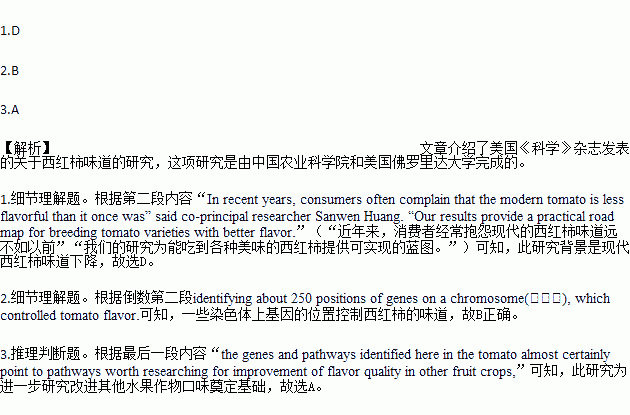题目内容
In a study published in the U. S. journal Science, researchers from the Chinese Academy of Agricultural Sciences(CAAS) and the University of Florida identified the chemical combinations and genetic recipe for better tomato flavor(味道).
“In recent years, consumers often complain that the modern tomato is less flavorful than it once was” said co-principal researcher Sanwen Huang. “Our results provide a practical road map for breeding tomato varieties with better flavor.”
For the study, a 170-person consumer group was created to evaluate 160 tomatoes representing 101 varieties, based on qualities such as “overall liking” and “flavor degree”. The results pointed to dozens of chemical compounds of interest, and further research using a statistical model discovered 33 flavor compounds connected with consumer liking, such as glucose(葡萄糖). The reason why modern tomatoes don’t taste good anymore is that a total of 13 of these flavor-associated compounds “were significantly reduced in modern varieties,” their paper wrote. Moreover, the researchers found that smaller fruit tended to have greater sugar content, suggesting that “selection for more sizable tomatoes has cost sweetness and flavor”.
Based on this knowledge, Huang and Professor Harry Klee of the University of Florida studied the whole genomes of 398 varieties of tomato, identifying about 250 positions of genes on a chromosome(染色体), which controlled tomato flavor.
“We’re just fixing what has been damaged over the last half century to push them back to where they were a century ago,” said Klee in a statement. “We can make the supermarket tomato taste noticeably better.” Klee said new tomato varieties with better flavor could be ready in three to four years. In addition, “the genes and pathways identified here in the tomato almost certainly point to pathways worth researching for improvement of flavor quality in other fruit crops,” they wrote.
1.According to the text, the study ________.
A. was carried out just through a survey
B. was conducted by Chinese researchers themselves
C. was completely focused on the genes of different tomatoes
D. was done with the background of declining flavor of tomatoes
2.The researchers have found that ________ in the study.
A. bigger tomatoes are much sweeter
B. some genetic positions affect the taste of tomatoes
C. some chemical compounds make tomatoes less tasty
D. a total of 13 flavor-associated compounds make tomatoes appealing in taste
3.What is the influence of the study according to the text?
A. The study lays the foundation for further researches to improve other fruit crops’ flavor.
B. The study makes it possible for us to have noticeably more tasty tomatoes next year.
C. The study provides a road for where to plant tomatoes with better flavor.
D. The study has fixed all the genes of existing tomatoes.
 天天向上一本好卷系列答案
天天向上一本好卷系列答案 小学生10分钟应用题系列答案
小学生10分钟应用题系列答案
